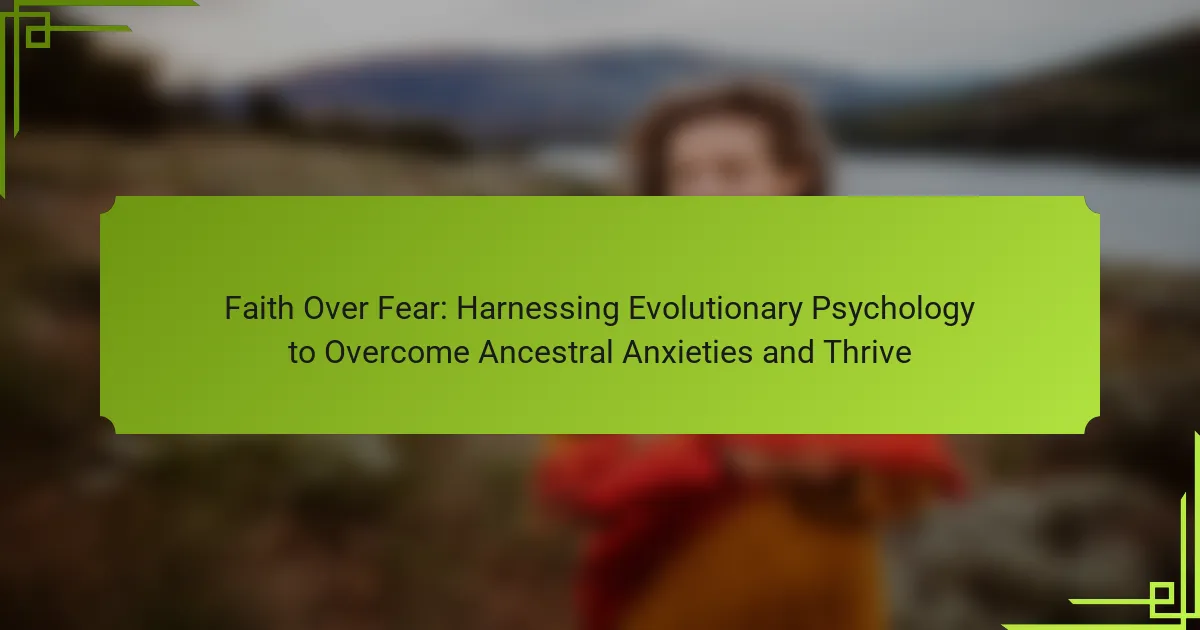Overcoming ancestral anxieties is essential for personal growth and resilience. This article explores how evolutionary psychology links innate fears to survival mechanisms. It discusses universal traits influencing fear responses, strategies to shift focus from anxiety to empowerment, and the role of purpose and community in fostering resilience. Understanding these concepts can help individuals manage modern fears and thrive in contemporary life.

How can evolutionary psychology help us understand ancestral anxieties?
Evolutionary psychology provides insights into ancestral anxieties by linking them to survival mechanisms. These innate fears, such as fear of predators or social rejection, shaped human behaviour and decision-making. Understanding these anxieties can help individuals recognise and manage modern fears, fostering resilience and personal growth. By applying evolutionary principles, people can reframe their fears, viewing them as remnants of a survival-oriented past rather than barriers to thriving in contemporary life. This perspective empowers individuals to harness their ancestral knowledge to overcome challenges and embrace opportunities.
What are the key principles of evolutionary psychology?
The key principles of evolutionary psychology focus on understanding human behaviour through the lens of our ancestral past. These principles include the idea that many modern anxieties stem from evolutionary adaptations to ancestral environments. Evolutionary psychology emphasises the role of natural selection in shaping psychological traits that influence decision-making, social behaviour, and emotional responses. By recognising these patterns, individuals can harness insights from evolutionary psychology to overcome fears and anxieties that may not serve them in contemporary settings. This approach encourages a deeper understanding of the biological and psychological mechanisms that drive human behaviour, ultimately leading to personal growth and resilience.
How do ancestral fears manifest in modern life?
Ancestral fears manifest in modern life through irrational anxieties, phobias, and stress responses. These instinctual reactions often arise from evolutionary survival mechanisms. For instance, fear of heights or snakes can be traced back to ancestral threats. Additionally, societal pressures can amplify these fears, leading to avoidance behaviours. Understanding these patterns allows individuals to confront and manage their fears effectively, promoting emotional resilience.

What universal traits influence our response to fear?
Universal traits that influence our response to fear include evolutionary instincts, social bonding, and individual resilience. Evolution has shaped our brain to react quickly to threats, enhancing survival. Social connections provide support during fearful situations, fostering a sense of safety. Individual resilience varies, with some people developing coping strategies that enable them to manage fear effectively. Understanding these traits can empower individuals to harness their responses and thrive despite anxieties.
What role does the fight-or-flight response play?
The fight-or-flight response plays a crucial role in managing fear and anxiety, enabling individuals to react to threats effectively. This physiological reaction, rooted in evolutionary psychology, prepares the body for immediate action, enhancing survival. It triggers adrenaline release, increasing heart rate and energy levels. Understanding this response helps individuals harness its power to overcome ancestral anxieties, fostering resilience and growth in modern life. By recognising triggers and responses, one can shift from fear to faith, promoting a proactive approach to challenges.
How do social bonds and community impact anxiety levels?
Social bonds and community significantly reduce anxiety levels by providing emotional support and a sense of belonging. Research shows that strong social connections can lead to lower stress hormones and improved mental health. Engaging in community activities fosters resilience and mitigates feelings of isolation, which are often linked to anxiety. Additionally, evolutionary psychology suggests that our ancestors thrived in groups, reinforcing the importance of social interactions for emotional well-being.

What unique strategies can be employed to harness faith over fear?
To harness faith over fear, employ strategies that shift focus from anxiety to empowerment. First, practice mindfulness to cultivate present-moment awareness, reducing ancestral anxieties. Second, utilise positive affirmations to reinforce self-belief and resilience. Third, engage in community support, fostering connections that enhance collective faith. Lastly, set achievable goals, allowing small successes to build confidence and counter fear.
How can cognitive reframing shift our perspective on fear?
Cognitive reframing can transform our perspective on fear by shifting it from a paralyzing force to a motivating challenge. This approach leverages evolutionary psychology, emphasising that fear can signal growth opportunities rather than threats. By recognising fear as a natural response, individuals can develop resilience, leading to enhanced coping strategies and personal growth. This shift fosters a mindset that prioritises faith over fear, encouraging proactive behaviour in the face of ancestral anxieties.
What are the benefits of exposure therapy in overcoming fears?
Exposure therapy effectively reduces fears by gradually desensitising individuals to anxiety-provoking stimuli. This approach leverages evolutionary psychology, recognising that ancestral fears often stem from survival instincts.
One significant benefit is the increased sense of control over anxiety, leading to improved emotional resilience. Exposure therapy fosters coping mechanisms, allowing individuals to confront and manage their fears rather than avoid them.
Additionally, this therapy promotes neuroplasticity, enabling the brain to rewire its response to fear stimuli. As a result, individuals can develop healthier thought patterns and emotional responses.
Ultimately, exposure therapy empowers individuals to thrive by transforming fears into manageable challenges, enhancing overall mental well-being.
What steps are involved in exposure therapy?
Exposure therapy involves several structured steps to effectively address ancestral anxieties. First, the therapist conducts a thorough assessment to identify specific fears. Next, they educate the client on the principles of exposure therapy and its goals. The third step is to create a hierarchy of fears, ranging from least to most anxiety-provoking situations. The client then gradually faces these fears in a controlled environment, starting with the least threatening scenarios. Finally, the therapist helps the client process their experiences and reinforces coping strategies to manage anxiety.
How can gradual exposure be effectively implemented?
Gradual exposure can be effectively implemented by systematically confronting fears in a controlled manner. Start with low-stress situations related to the anxiety, gradually increasing exposure as comfort levels rise. This method builds resilience and reduces overall anxiety. Regular reflection on progress enhances understanding of emotional responses, reinforcing positive outcomes. Consistency in practice is crucial for long-term success.

What rare attributes contribute to resilience against anxiety?
Faith, resilience against anxiety stems from unique attributes such as purpose, community support, and adaptive coping strategies. Purposeful living fosters a sense of direction, while community support provides emotional reinforcement. Adaptive coping strategies, like reframing thoughts, empower individuals to manage anxiety effectively. These rare attributes enhance psychological resilience, enabling individuals to thrive despite ancestral anxieties.
How does genetic predisposition affect our anxiety responses?
Genetic predisposition significantly influences our anxiety responses by shaping how we perceive and react to stress. Research indicates that specific genes, such as those involved in serotonin regulation, can affect anxiety levels. Individuals with certain genetic markers may experience heightened sensitivity to environmental stressors, leading to increased anxiety. Understanding this connection empowers individuals to harness evolutionary psychology, fostering resilience against ancestral anxieties. This approach emphasises the ability to reframe our responses, promoting mental well-being despite genetic predispositions.
What role does early childhood experience play in shaping fear responses?
Early childhood experiences significantly shape fear responses by establishing foundational emotional patterns. These early interactions influence how individuals perceive and react to threats later in life. Research indicates that children exposed to supportive environments develop healthier coping mechanisms, while those facing neglect or trauma may exhibit heightened anxiety. Understanding these dynamics allows for targeted interventions that promote resilience.

How can we apply evolutionary psychology principles to daily life?
Applying evolutionary psychology principles to daily life involves recognising and addressing ancestral anxieties. This approach fosters resilience and promotes mental well-being.
Understanding the evolutionary basis of fears helps individuals reframe their responses. By identifying triggers rooted in survival instincts, people can develop strategies to manage anxiety effectively.
Practising mindfulness and self-awareness enhances emotional regulation. This allows individuals to confront fears without being overwhelmed, leading to personal growth and improved decision-making.
Engaging in social connections reinforces support systems. Positive relationships can mitigate stress and enhance overall life satisfaction, reflecting evolutionary advantages in community living.
What practical techniques can help reduce anxiety?
To reduce anxiety, practical techniques include mindfulness, cognitive restructuring, and controlled breathing. These methods leverage evolutionary psychology to address ancestral fears, promoting resilience and emotional well-being. Mindfulness enhances present-moment awareness, reducing stress responses. Cognitive restructuring challenges negative thought patterns, empowering individuals to reframe their experiences. Controlled breathing regulates physiological reactions, fostering calmness and clarity. Each technique supports the overarching goal of thriving despite anxiety.
What common mistakes should be avoided when managing fears?
To manage fears effectively, avoid common mistakes that can hinder progress. One mistake is allowing fear to dictate decisions, leading to avoidance behaviours. Another is failing to challenge negative thoughts, which can reinforce anxiety. Ignoring the importance of support systems can also impede growth. Lastly, neglecting self-care practices may exacerbate fears.
What expert insights can enhance our understanding of fear management?
Expert insights into fear management emphasise understanding evolutionary psychology to address ancestral anxieties. This approach reveals how fear responses shaped human survival, highlighting the importance of recognising these instincts in modern contexts. Techniques such as cognitive restructuring can help individuals reframe fears, transforming them into opportunities for growth. Additionally, mindfulness practices foster awareness of fear triggers, enabling proactive management. Research indicates that integrating these insights can significantly enhance emotional resilience and overall well-being.
How can we cultivate a mindset of faith to overcome fears?
Cultivating a mindset of faith can effectively help overcome fears. Begin by recognising that fear often stems from evolutionary instincts designed for survival. Embracing faith allows individuals to reframe these instincts into positive actions.
Practice mindfulness and meditation to strengthen this mindset. Research shows that these techniques can reduce anxiety and foster a sense of control. Additionally, surrounding yourself with supportive communities reinforces faith, providing encouragement when facing fears.
Set small, achievable goals that align with your values. Each accomplishment builds confidence, reinforcing the belief that you can overcome challenges. This approach transforms fear into motivation, facilitating personal growth and resilience.
Finally, develop a habit of gratitude. Acknowledging what you are thankful for shifts focus from fear to appreciation, enhancing overall well-being and fostering a positive outlook.
